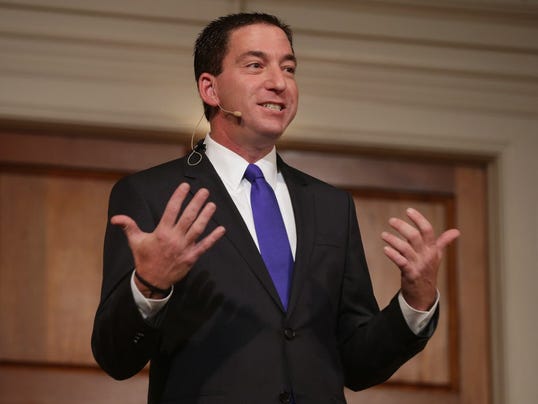Kirsten Powers: Glenn Greenwald vs. fellow journalists
Thank, don't criticize, the man who exposed NSA spying.
Since
breaking the National Security Agency spying story for The (London) Guardianlast
year, Glenn Greenwald has been the target
of attacks fromfellow
journalists who seem to labor
under the delusion that it's their job to protect the government.
Soon
after he reported revelations of government malfeasance
provided by whistle-blower Edward Snowden, NBC's David Gregoryasked Greenwald, "To the extent that you have
aided and abetted Snowden ... why shouldn't you, Mr. Greenwald, be charged with
a crime?"
This
accusation, dressed up as a question, was nonsensical. That it came from a
fellow journalist was bizarre. How could reporting news be "aiding and
abetting"? What crime could Greenwald possibly have committed? Most important,
which government minion tricked the host of Meet the Press into thinking that reporters can't —
and don't — publish government secrets?
Now
we have Michael Kinsley doubling down on the chilling notion that certain types
of investigative journalism should be criminalized. In his New York Times review of Greenwald's new book, No Place to Hide, Kinsley argues, "There shouldn't be a
special class of people called 'journalists' with privileges like publishing
secret government documents."
Actually,
there should be, and there is. Without
that protection, The Times could not have published the Pentagon
Papers. Take that protection away, and we have zero oversight of the
government from outside forces.
Kinsley writes that the decision of which official
secrets can be made public "must ultimately be made by the government." If a
reporter violates this norm, there should be "legal consequences."
Kinsley
is too smart to believe this. Perhaps he can't see past his contempt for
Greenwald, who he complains is "unpleasant" and a "self-righteous
sourpuss."
Last
year, The Times media writer David
Carr drilled down on the
strange fury Greenwald inspires in other journalists. Carr discovered that there
was a general "distaste" of Greenwald and his ilk because, said one journo,
"they are ... not like us."
That
Greenwald is not a member of the Washington insider club seems to be the real
problem here. Instead, he views himself as an outsider and adversary of the
powerful, traits once commonplace among journalists.
Pentagon
Papers leaker Daniel Ellsberg noted that the friendly fire against Greenwald is
unusual. Ellsberg told
an interviewer last year that
though he himself was an enemy of the government for leaking secrets during the
Vietnam War, "journalists were not turning on journalists."
Political
philosopher Hannah
Arendt once noted, "To think
critically is to always be hostile." This should be the mantra of all
journalists. As for Greenwald's critics, perhaps they could turn their hostile
gaze from him to a more worthwhile target: the government they've been charged
with holding accountable.
Kirsten
Powers writes weekly for USA TODAY.

No comments:
Post a Comment